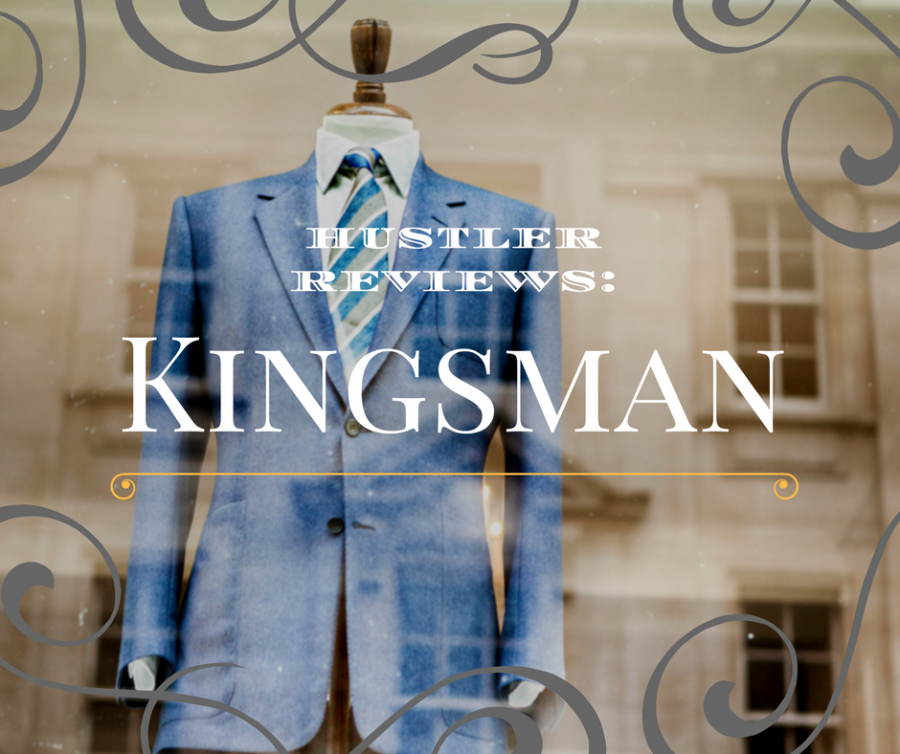The Kingsmen are back and snider than ever. In The Golden Circle, the second chapter, the Oxford-wearing wiseguys join forces with their backcountry compatriots, the Statesmen. English scotch is chased with Kentucky whiskey as our heroes face off against Poppy, a downhome retrophile and narcotics drug lord. Forget what you think you know about espionage. The Golden Circle is a postmodern, high-octane thrill ride unlike any other.
When we first reunite with our protagonist Eggsy, he’s accosted by a familiar foe on the streets of London. A vicious brawl ensues in, on and around the Kingsman’s moving taxi, as punk rock plays over the taxi radio. This right-hook of a first scene resonates with fans of the first film and rapidly familiarizes others with the franchise.
Gary ‘Eggsy’ Unwin, played by Taron Egerton, is a precocious operative among the Kingsmen, Britain’s most esteemed spy organization. He is gritty as well as refined, as his South London upbringing is plebeian among the silver spoon Kingsmen. Mark Strong and Colin Firth return in their roles, too—the loyal aide Merlin and Firth the wise mentor, respectively. These three are delightful together. Firth and Strong are superb as veteran spies, while Egerton is a crumpet-eating Han Solo, flashing roguish charm at every turn. Julianne Moore is our lead antagonist Poppy Adams, a heroin-slinging megalomaniac who seems more at home in Williams Sonoma than in the jungles of Cambodia plotting global ruin.
The Golden Circle is a lot of fun. Between the evident parodies of a stuffy genre, exotic locales and stylized fight sequences, the viewer is rarely bored with this movie. It’s also engaging in its self-awareness, which is especially rarified among espionage thrillers.
The second chapter is more preposterous than the first. The Golden Circle’s womanizing is more gratuitous, its use of slow motion and fast motion more frequent, and its overall implausibility stretched to the point of fantasy. Viewers hoping for a fast-paced, audacious caricature of action/adventure flicks should definitely see The Golden Circle. Fans of the snide and satirical will have a blast. However, those preferring more grounded, substantive films should be wary. Kingsman: The Golden Circle is snide and stylistic, but it is not substantive.
The Golden Circle is too preoccupied with satirizing James Bond movies to pursue any level of depth on its own. This offense is most evident in the resurrection of Colin Firth’s Galahad. First off, his return cheapens the weight felt from his death in The Secret Service, which was a powerful criticism of the genre’s ever-convoluted preservation of heroes. Moreover, it’s an admission that the franchise is too weak at the box office and/or at its core to succeed without one supporting character. Galahad and Eggsy’s mentor/protégé relationship is what grounds the high-flying, larger-than-life antics of the first chapter of Kingsman and makes it worth watching again and again. Vaughn recycling this relationship prevents the second chapter from enjoying any of its own depth
A half-baked villain is another primary flaw in The Golden Circle. Moore’s Poppy Adams is a gleeful sociopath whose lazy exposition is inexcusable The Golden Circle is remarkably amateur in telling us that Poppy is a formidable drug lord rather than showing us why. Her “evil plan” suffers from similar underdevelopment, as her use of recreational drugs to infect people with a deadly virus is cheesy and contrived.
Similar to Poppy’s under-characterization is its protracted and misplaced political subplot involving the American president and his top advisers. The president shows a cold indifference to the millions across the globe infected with Poppy’s virus. This creates a secondary and illogical conflict between the president and his aides, who are the voices of the audience’s inherent compassion and decency. This subplot feels so oddly specific—given the current political climate—and distinctly unrelated to the central conflict of the movie that the viewer wonders if Vaughn had other issues on his mind at this point in the writing process.
The Golden Circle’s attempts to be relevant are cringeworthy. Tinder, Twitter, and music festivals are thrown in to be trendy, yet come across as just awkward. Does Vaughn really think I’ll “swipe left” (yes, this phrase is in the movie) on a movie without these references? What really makes me swipe left is this movie’s disgustingly-vivid sex scene in which Vaughn clearly forgets that less is more when it comes to the carnal. This scene is yet another parody of the womanizing cliché in spy movies. Yet what some may find provocative and hilarious, others will easily findvulgar and offensive. It’s in these areas of cultural relevance and carnal knowledge that Kingsman’s postmodern self-reflection becomes problematic, I believe. Vaughn clearly sees flawed norms in the spy genre, yet his approach in criticizing them is exaggerating them to the point where many find his audacity more offensive than the original norms themselves. Kingsman is certainly provocative in challenging these norms, yet its first chapter is more measured and substantive in its approach than its second.
Overall, I had a lot of fun watching Kingsman: The Golden Circle when I wasn’t rolling my eyes over its superficial screenwriting. As mentioned previously, fans of self-referential comedy and stylized fight scenes will have a blast with this movie. The self-reference and reactionary ideology The Golden Circle aims for is flawed-or at least its approach to such. In all his genre-spoofing and evident moralizing in The Golden Circle, Vaughn fails to give us a deeper reason to care about the second chapter in Eggsy Unwin’s journey. His genre qualms and stylized storytelling are on full display in this second chapter and make for an entertaining, thought-provoking experience. However, The Golden Circle’s lack of depth and thoughtful structure are the reason I give it a 6/10.

